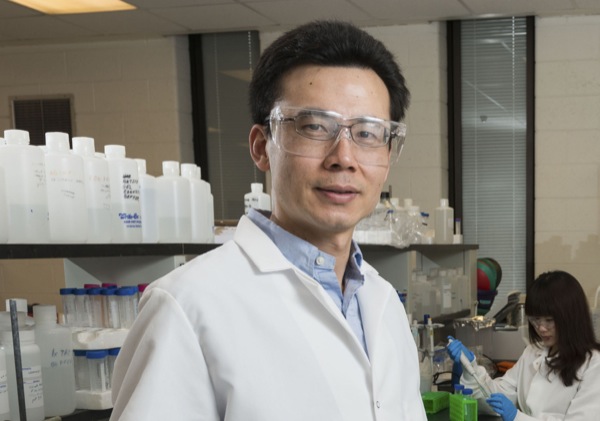
ACS award
Zhuang receives research scholar grant from American Cancer Society
10:46 a.m., June 23, 2014--Zhihao Zhuang, associate professor in the Department of Chemistry and Biochemistry at the University of Delaware, has received a four-year, $792,000 Research Scholar Award from the American Cancer Society. The award will fund his lab’s ongoing work on a molecular approach to boosting the effectiveness of drugs used to fight cancer.
Zhuang and his team recently reported a new finding in this research. Their discovery that a deubiquitinase (or DUB) complex may be a key regulator of the DNA damage response and a target for overcoming resistance to platinum-based anticancer drugs was published in the journal Nature Chemical Biology on Feb. 16.
Research Stories
Chronic wounds
Prof. Heck's legacy
Their work addresses two major pathways in the DNA damage response, the translesion synthesis pathway and the Fanconi anemia pathway. “We’re very encouraged by the fact that a single molecule is effective at disrupting two essential DNA damage tolerance pathways,” Zhuang says. “This is very promising as a new weapon in the arsenal against cancer.”
The letter informing Zhuang of the award said that he had been selected to join “an elite group of scientists and health care professionals who have received awards from the American Cancer Society.” That select group includes researchers from Yale University, the University of Pennsylvania, MIT, Stanford University, the University of Chicago, and a number of other prestigious institutions across the U.S.
“Support from the American Cancer Society is evidence that our research is relevant to their mission of finding answers that save lives,” Zhuang says.
Although larger states like California, Illinois, and Pennsylvania attract multiple research scholar awards from the American Cancer Society each year, Zhuang and his team received the only one in Delaware in 2014.
About the American Cancer Society
For more than 65 years, the American Cancer Society has funded research and training of health professionals to investigate the causes, prevention, and early detection of cancer, as well as new treatments, cancer survivorship, and end of life support for patients and their families. Since its founding in 1946, the American Cancer Society’s extramural research grants program has devoted more than $4 billion to cancer research and has funded 47 researchers who have gone on to win the Nobel Prize.
Article by Diane Kukich
Photo by Evan Krape








